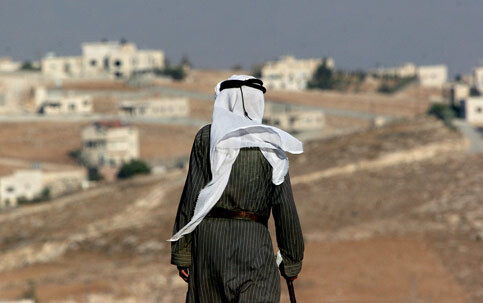
A Palestinian shepherd watches over his sheep in the West Bank town of Beit Sahour near Bethlehem, August 2008. (Luay Sababa/MaanImages)
“I had a dream last night,” Sami (not his real name) told my teammates and me while we sat munching sliced tomatoes and olives one hot afternoon. Sami told us that in his dream he had climbed to the top of one of the pine trees at the edge of Havot Ma’on, an illegal Israeli settlement outpost. Below him, Sami could see Israeli settlers stealing the fodder that he uses to feed his sheep.
“Come down here,” one of the settlers called up to Sami. “No, no,” he said. “I’ll up stay here.” But the settler reached up into the tree and pulled Sami down to the ground. “They tried to kill me,” he explained. He wrapped his hands around his throat to show how the settlers in his dream had choked him. “And then I woke up.”
Sami says that his children often have nightmares like the one he described. They used to have even more, he told us, but now his village is more organized and more successful in nonviolently resisting the attacks of Israeli settlers. Still, to get to school in al-Tuwani Sami’s children must walk between an Israeli settlement and its outpost, along a road where adult settlers have attacked them with chains and stones. Because the violence against the children has attracted media attention, they are now escorted by the Israeli military. Seeing Sami’s children greet me with smiles and laughter is a delight, but also it feels strange, like a dream.
A week ago, I looked out on Havot Ma’on from on a hillside where I had never sat before. As I saw the settlement outpost from a new angle, I found myself filled with jealousy. Before me on the wooded outpost, in adjacent valleys, and in the neighboring houses of Ma’on settlement, settlers moved around freely, without fear of attack or arrest. My first reaction was “They have so much space!” The sight of the ever-expanding settlement reminded me of another evening when Sami asked my teammates and I to watch for settlers as he and his family made their way home to Magher al-Abeed. Sure enough, as the family climbed over the hills a car left the settlement and sped after them. “Thank you, thank you!” Sami cried, when I called to tell him settlers were coming. Over the cell phone I could hear him calling to his family, telling them to run home. “What a nightmare,” I said to myself.
Rarely do dreams of Israeli settlers and soldiers disturb my sleep, but I lately find it increasingly difficult to put my faith in a dream of a better future for Sami and his family. A taxi driver recently quipped to me, “If we have peace, we are in paradise.” Sitting on a hillside watching the sunset stain the sky, paradise is certainly the word for what I see. But every day the Israeli government seems to have less will to deal with the extremist Israeli settlers who terrorize Palestinians like Sami. The longer I live in Palestine the less certain a future of peace and justice feels to me.
But sometimes when I meet the children coming to school in the morning, Sami’s daughter Diana catches my eye. Diana is still in primary school, but she walks with commanding dignity. I stand beside Diana as she explains to the Israeli soldiers who escort her to school that they arrived late and did not meet the children at the correct location. “You have to come by 7:30,” she insists. And as I watch this little girl speak to the soldiers with such conviction, my despair eases. For a moment, I stop wondering, “When will this nightmare end?” and begin to think, “How much longer can this injustice possibly continue?” In the face of Palestinian children dreaming of a better tomorrow, surely today’s horrors cannot stand for long.
Joy Ellison is an American activist with Christian Peacemaker Teams, an organization that supports Palestinian nonviolent resistance. She lives in al-Tuwani, a small village in the South Hebron Hills that is nonviolently resisting settlement expansion and violence. She writes about her experiences on her blog, “I Saw it in Palestine.”





